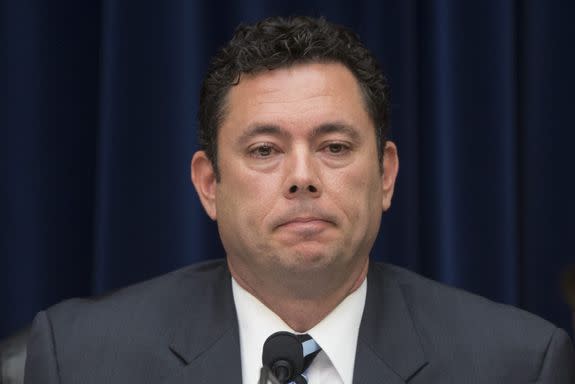3 reasons to worry about the FBI's facial recognition program

The FBI quietly developed a facial recognition network that allows law enforcement to identify people in the United States without their knowledge.
Now lawmakers want to know why the agency didn't tell people about it.
SEE ALSO: This creepy Facebook stalking app was a hoax—but it should still scare the hell out of you
"Why did the FBI not fulfill the requirement of the law?" asked House Oversight Committee chairman Jason Chaffetz at a hearing on Wednesday.
The FBI didn't let citizens know the agency was collecting photos from motor vehicle departments, according to a report from the Government Accountability Office. And a lot of people can be found on law enforcement facial recognition networks — around half of American adults, according to a study from Georgetown University's Center on Privacy and Technology.
At the hearing, House members hit on a bunch of topics with Kimberly Del Greco, the FBI's deputy assistant director of the Criminal Justice Information Services Division.
Here are three of the most alarming issues from the hearing.
Racial profiling
Elijah Cummings, a Democrat from Maryland who lives in Baltimore, was more than a little worried about the Georgetown study, which showed facial recognition was less accurate when trying to identify black people.
“If you’re black, you’re more likely to be subjected to this technology, and the technology is more likely to be wrong," he said. "That’s a hell of a combination.”
Illegal immigration
Chaffetz was angry that the FBI didn't disclose its program to the public, but he seemed OK with it being used to single out undocumented immigrants. His comments from early in the hearing, via Gizmodo:
"The technology will also show us, the statistical data will show us, the bigger the database, the more difficult it is for the facial recognition technology to get it right. If the database was smaller to known criminals, wanted criminals, people that are here illegally, maybe those are the types of things that we should be focused on."

Image: Reynolds/Epa/REX/Shutterstock
Government overreach
Rep. Paul Mitchell, a Republican from Michigan, seemed personally offended by the lack of disclosure.
"I wasn't informed that when my driver's license was renewed, my photograph was going to be in a repository that could be searched by law enforcement across the country," he said.
Rep. John Duncan worried the U.S. was becoming a "federal police state," but he needn't have mentioned "federal." Major local police departments are already using the technology. Some are exploring "real time" facial recognition synced with surveillance cameras.
Overall, several representatives felt this was the number one problem: the FBI didn't really tell anyone they were using facial recognition. The Department of Justice created a "privacy impact assessment" in 2008 and is legally required to update the assessment "whenever agencies develop technologies that collect personal information," according to the GAO report. That didn't happen.
Despite the outrage in Congress today, one of the hearing's conclusions was that the FBI will "continue to pursue" what's called a "memorandum of understanding" with motor vehicle departments across the country to add driver's license photos to their database.
They've already obtained such understandings with 18 states.
